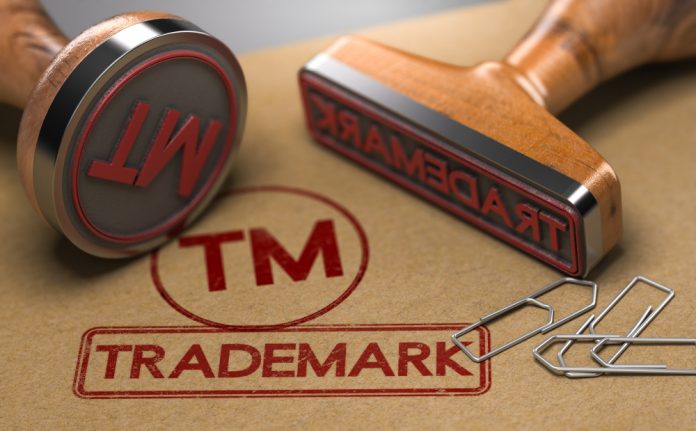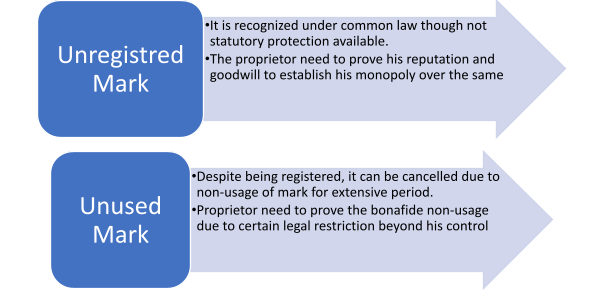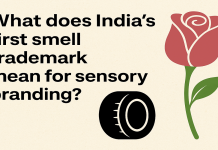This article is written by Swapna Gokhale who is pursuing a Diploma in Intellectual Property, Media and Entertainment Laws from LawSikho.
Table of Contents
Introduction
What is a trademark? Trademark is a type of intellectual property. It is simply a brand which consist name, logo, symbol etc. representing a business or particular product. Once you apply for a trademark registration you can use suffix “TM” to your mark. And when you get the trademark registration with the national Trademark registry, you get the authority to use a typographic symbol along with your brand. Trademark Registration gives your brand statutory protection to protect from being infringed by someone else. In case of such infringement, you can start legal proceedings against it. In a suit for infringement, the presumption is always in favor of the trademark holder. You can register the mark which you proposed to be used for your business.
One can get multiple trademark registration for his brand e.g. In brand NIKE, the name NIKE and the swoosh symbol both are registered separately under trademark law. Similarly, in case of McDonald’s, the name, symbol, Yellow Red colour combination everything is registered under Trademark Law.
But imagine, you are doing your business without registering your brand name under Trademark Act or you registered your trademark but not used the said mark for your product or services for which the same is registered. Does non-registration take away your right to trade or right to take objection against infringement? Or does non-usage of the registered mark will give rise to its cancellation?
Let’s find here.
Protection granted to registered mark
Trademark Act, 1999, in India, grants strong protection to the registered marks. An unregistered mark has a high risk of losing the right over it. Because the registered brand always stood in a better position than unregistered one, under the law.
A registered trademark is protected for 10 years. Before 6 months of the completion of your trademark term, you need to renew it by filing renewal application to get the extension of protection for further 10 years. Registration of the mark plays an important role while building commercial value, goodwill and reputation in the eyes of your customers.
Normally trademark registration is territorial. Therefore, you need to file a separate application for trademark registration in each country. However, there are international conventions such as the Madrid Protocol that serves as a centralized registration system for granting trademark protection to all member countries. In 2013, India assented to becoming a member of this international treaty for trademarks. Filing under Madrid protocol through the Indian Trademark office grants right to the domestic companies to protect their mark across multiple jurisdictions of their choice.
What is an unregistered mark?
In India, trademark registration is not compulsory. A trademark can be a registered trademark as well as an unregistered trademark. An “unregistered trademark” is one that does not possess statutory benefit. If anyone is using the particular mark since a long time for a particular product or business and gained a sufficient amount of reputation then such mark can be recognized as a trademark without being officially registered under Trademark Act, 1999. Such unregistered mark can still be protected under common law tort of “Passing off”. Thus, owner of an unregistered trademark may be able to prevent use by another party of an infringing mark pursuant to the common law of passing off. The owner or proprietor of such unregistered mark does not possess a right to sue for infringement under S. 27 of Trademark Act, 1999. However, such mark gets common law benefits.
Difference between Registered and Unregistered mark
|
Registered Mark |
Unregistered mark |
|
Registered under Trademark Act, 1999. |
Not officially registered under Trademark Act 1999. |
|
Statutory remedy for infringement under Trademark Act, 1999. |
Remedy of passing-off action governed by Common law. |
|
Prima facie validity is available. |
Prima facie validity not available. Owner has to prove the validity of mark. It may gain protection, where the goods and services have a highly significant position in the market with prior use. |
|
Represented by the symbol ® |
Represented by the trademark symbol TM. |
|
Countrywide protection is available by registration. |
Owner need to prove the area in which it has gained the reputation of his unregistered mark. |
Passing off Action for unregistered mark
Even if an unregistered mark doesn’t have a statutory shield-like registered marks, the law does recognize such mark which has acquired sufficient amount of reputation without registration. In case of misuse of a registered mark, the right holder can initiate an infringement action against the violating party. But for misuse of unregistered marks, the right holder is entitled to claim protection under the law of passing off.
An action against passing off is based on the principle that ‘a man may not sell his goods under the pretense that they are the goods of another man’. The regulation of passing off prevents one man or woman from misrepresenting the items or services to that of others.
Passing off is a type of unfair trade competition by which one person seeks to profit from the reputation of another in a particular trade or business.
The fundamental question on this tort turns upon whether the defendant’s conduct is such as deceive or mislead the general public to the confusion between the industry activities of the two.
Essential elements of Passing-off
The protection to the un-registered mark by way of passing off action principally can be based on two elements.
- Prior use – Even if registered mark acquires presumption in his favor, Indian trademark law fairly recognizes ownership of a trademark on based on first-to-use basis. Unlike the law on patents or designs, the trademark law recognized the first-to-use rule over the first-to-file rule. As a first-to-use country, unregistered trademarks with prior use can be protected under common law in India.
- Goodwill and Reputation – Goodwill and reputation of the mark are essential in a passing-off action. To enforce its rights in an unregistered trademark, the rights holder must prove that the mark has acquired goodwill and reputation in the specific territory and that the public associates it with the rights holder. But the question is whether use of a mark must be proved by way of local sales, or whether international use can be taken into account. Initially, only the reputation of the unregistered mark in specific territory only used to taken into consideration. However, with growing globalization of trade, the Indian court has also recognized transborder trade reputation. That means, a mark which has acquired sufficient amount of reputation in India but not registered in the Indian Trademark office, can be protected under Trademark Law.
In a typical passing-off suit, the courts will generally consider the following issues:
- whether the you are prior user of the mark;
- whether your brand/goods have acquired distinctiveness, sufficient amount of goodwill and reputation in the market and are associated in the minds of the general public with your mark; and
- whether there is a misrepresentation by the defendant with regard to its goods and such misrepresentation is likely to lead to confusion in the minds of consumers, with the result that they may treat the defendant’s goods as those of yours.
Challenges for unregistered secondary marks attached to the primary registered marks
Where trademarks and their features attain popularity, a rights holder may face direct infringement of its mark through use of an identical mark on competing products or un authorized use of some elements of the mark or use of the mark on completely different products. In such situation the relief of passing off action gives sufficient protection to the brand owner, provided, he satisfies the popularity element of his brand for particular product or services in the market, as mentioned hereinabove. It is sufficient to establish merely that the defendant’s acts are of a nature that is likely to mislead the public into purchasing the goods.
Legal provisions
In India, S. 34 and S. 35 of Trademark Act, 1999 gives the protection for unregistered mark. According to these sections, prior un registered user will get priority over the subsequent user even though registered and it safeguards interest of a person with bonafide use of name or place of business for particular description of goods.
Thus, though the Trademark Act, 1999 does not give all the bundle of rights to the unregistered users similar to that of to the registered users, both the above-mentioned sections under Trademark Act, 1999 protect the interest of unregistered users which gives opportunity to them to continue their long-standing business without threat of an action of infringement of mark by subsequent registered user of the similar mark.
Position of unregistered trademark in India having trademark registration in abroad
With the rapid growth of globalization of trade and commerce any of the product can be available anywhere in the world irrespective of its origin.
The Indian courts have also been increasingly recognizing the reputation of foreign trademarks. Hon’ble the Supreme Court delivered a landmark decision in N.R. Dongre vs. Whirlpool Corporation, wherein trans-border reputation has been a well-accepted proposition for claiming a remedy for passing-off even though the trademark has not entered the Indian markets.
Recently, Indian courts have differed from the historic principle that goods or services must be available in India to establish goodwill or reputation. In a case concerning use of the mark 70’CLOCK, in Kamal Trading Co. and Ors. V/s Gillette UK. Ltd., 1988 (8) PTC 1 (BOM): Court observed that “It is necessary to note that the goodwill is not limited to a particular country because in the present days, the trade is spread over the world and goods are transported from one country to other rapidly and on an extensive scale. The goodwill acquired by the manufacturer is not necessarily limited to the country where the goods are freely available because the goods though not available are widely advertised in newspapers, periodicals, magazines and in other media. The result is that though the goods are not available in the country, the goods and the mark under which they are sold acquires a wide reputation.”
With the growth of the internet and modern technology and means of communication like radio, television and broadcasting, the element of reputation spill over to India is relatively easier to establish as compared to the position which existed even one decade ago.
Court opinion on unregistered Trademark
Trademark offers protection under statute. But that doesn’t mean that the unregistered mark can lose their yearlong identity merely because of non registration. Our constitution has given everyone right to trade. But after few years of business, the business name or brand becomes identity of the business which cannot be disturb for the reason of non-registration. In a catena of judgments, court has opined that in the passing off case, irrespective of duration, of use, the element of loss to the repute and goodwill of the plaintiff’s business, do plays vital role in the decision.
- In ITC Limited v/s Britannia Industries Limited, the Delhi High Court considered the issue of unregistered trade dress in relation to biscuit packaging. ITC filed the suit for passing off to safeguard its rights in the yellow and blue packaging of Sunfeast Farmlite Digestive – All Good biscuits, though unregistered and restrain Britannia from using a deceptively similar trade dress for its Nutri Choice Digestive Zero biscuit packaging. The court granted the injunction; however, the Division Bench of Delhi High Court in FAO(OS) (Comm) No. 77 of 2016 reversed the order on appeal.
It held that within a six-month lifespan, the yellow and blue colour combination had not become distinctive of ITC so as to claim exclusivity and prevent competitor use. Thus, appeal of Britannia was allowed.
This judgment underlined the very principle of passing off action that in order to succeed the unregistered trademark, you should able to show the distinctiveness even within short span of time, so as to normal intellectual people could associate it with your brand.
- In M/s. L. D. Malhotra Industries v. M/s. Ropi Industries, I.L.R. 1976 (1) Delhi 278 (1), Delhi High court had opined that “Registration under the statute does not confer any new right to the mark claimed or any greater right than what already existed at common law and at equity without registration. The trademark merely affords further protection under the statute. Common law rights are left wholly unaffected.”
- In a very interesting case, Kamal Trading Co. and ors. V/s Gillette UK. Ltd., 1988 (8) PTC 1 (BOM): Hon’ble court very beautifully elaborated the concept of transborder reputation and goodwill.
In this case, the UK based subsidiary company Gillette was manufacturer and seller of safety razors, razor blades, shaving cream, shaving bushes etc. It has acquired registration for their mark 7 o’clock somewhere in 1915, but because import restrictions company could not export their goods to India after 1958. In November 1985, defendant came to know that appellant herein using same brand name 7 o’clock for their product Toothbrush. Defendant herein instituted suit for infringement which was allowed. Against this order appellant herein filed appeal before Hon’ble Bombay High Court. Hon’ble court after hearing both the sides opined rejected the appeal by accepting the contention of the defendant herein that, the mark 7 O’CLOCK of the defendant company Gillette, has acquired worldwide reputation and the same can-not get extinguish merely because goods were not available in the country for some period.
In the present days, goods and the mark under which they are sold acquire reputation even though they are not available in particular country for certain period.
What is Unused Mark?
We apply for trademark in order to use the same for the product or services we are intending to protect. Then what will happen if we do not use the said trademark which was proposed to be used or discontinue the usage for several years?
The mark which was applied for protection under relevant Trademark Law is expected to use or continue to use after getting registration. The basic object of registration is to give right to the owner to use the said mark for his product or services intended. Thus, if we registered our brand proposed to be used and not commenced the usage of the mark for the product or service, or abandoned the usage of mark for long period of time then it may entitle for cancellation from trademark register. In this cancellation process, normally a third-party file an application who want to register similar mark for his product or business, claiming the same which is already been registered is not in use for last more than five years.
46 of Trademark Act, 1999 allows the application for TM registration for a mark which is proposed to be used for a company to be formed. In India, S. 47 (1) of Trademark Act 1999, allows for the cancellation of a trademark registration if, for a continuous period of five years and three months from the date on which the mark was entered into the Trade Marks Register, there has been no bona fide use of the trademark for the goods/ services covered by the registration. The terms unused or abandoned is also recognized under foreign trademark laws e.g. UK trademark Law imposed this limitation of 5 years for usage of trademark whereas in US Trademark Law, this limitation period is of 3 years.
How to prove the usage of mark?
There is legal provision under the Trademark Act, 1999 protecting the unused mark usage of which interrupted due to some unavoidable circumstances or due to some bonafide reason.
Though S. 47(1) of Trademark Act, 1999, allows cancellation of a trademark registration if, for a continuous period of five years and three months, subsection (3) of S. 47 provides the protection to such non-used mark due to special circumstances in the trade, which includes restrictions on the use of the trademark in India imposed by any law or regulation and not to any intention to abandon or not to use the trademark in relation to the goods or services to which the application relates. Therefore, bonafide non-usage of mark deserves fair protection under the Trademark Act, 1999. e.g. if there is any restrictions imposed by any law on trademark for certain period in certain area or country or during the transfer or assignment of the business along with trademark, in such cases there may be interruption into the usage of the mark. All such cases are to be decided based on facts and circumstances of each case.
Court opinion on unused Trademark
In case of suits for removal of Trademark, the intension to abandon the trademark need to be establish by the party who approaches the court for removal of the mark from register.
Courts have, over the years, through numerous judgements, settled the definition of “use” in relation to cancellation actions. If the trademark in question is used on goods, say on packaging or on the good itself or in relation to services, on promotional material relating to a service, then a trademark is considered to be in “use”. However, “use” also includes actions other than actual sale of goods or rendering of services. For instance, if you can show that you have taken a preliminary step to use the mark in India. Further Indian courts have held that advertisement prior to the active usage of the trademark in India i.e. pre-use advertisement of a mark will also constitute as “use” in order to defend a cancellation action.
- In J N Nicholas Ltd v Rose and Thistle AIR 1994 Cal 43, 98 CWN 216 , Hon’ble Calcutta High Court interpreted that ‘use’ does not necessarily mean and imply actual physical sale; even mere advertisement without having even the existence of the goods can be said to be a ‘use’ of the mark.
- In one of the interesting case, Vishnudas Trading as Vishnadas Kishendas V/s Vazir Sultan Tobacco Co. Ltd. (1997 4 SCC 201), the Hon’ble Supreme court laid down that a trader or manufacturer who is trading only one or some of the articles or goods under trademark and has no bonafide intension to trade or manufacture the other articles or goods falling under that class but obtained trademark registration for entire articles of that class then registration can be liable to restrict to the specific articles or goods which are actually intended to be traded in or manufactured.
Key points to remember for unused and unregistered mark
Conclusion
Brands are a powerful tool, which can repeat nostalgic memories from consumers for many years. To avoid guesswork, it is always advisable to register your brand under respective trademark law.
By catena of decisions, it is now settled that a prior user of trademark has rights even over a later registered user. However, an unregistered trademark user enjoys only limited rights. An action against infringement has its own force over the action against passing off. The burden of proof is more severe in case of the unregistered and unused marks. As far as an unused marks, the ‘use’ must be significant, commercial use of the mark on or in relation to the goods/ services. In absence of evidence regarding continuous use of the mark, the owner will have a threat to lose the protection granted under relevant trademark Law. This provision is more or less similar in all the countries including India.
However, due to the absence of specific and more clear provisions related to the protection of unregistered and used marks these cases heavily relied upon the judicial pronouncements. And judicial pronouncements depend upon the facts and circumstances of each case which can-not become a rule.
Hence the best approach for most businesses is to register and enjoy your trademark by using it as much as possible!!
References
- https://www.worldtrademarkreview.com/portfolio-management/india-courts-step-protect-unregistered-trademarks-and-trade-dress
- https://www.khuranaandkhurana.com/2012/05/19/removal-from-trademarks-register-due-to-non-use/
- https://www.mondaq.com/india/trademark/875442/non-use-cancellation-actions-in-india
- https://selvams.com/blog/trans-border-reputation-spills-india/
- https://www.wipo.int/edocs/pubdocs/en/wipo_pub_653.pdf
- https://www.mondaq.com/india/trademark/537964/difference-between-unregistered-and-registered-trademark
- https://www.majmudarindia.com/pdf/Protection%20of%20unregistered%20trademark.pdf
Students of Lawsikho courses regularly produce writing assignments and work on practical exercises as a part of their coursework and develop themselves in real-life practical skill.
https://t.me/joinchat/J_0YrBa4IBSHdpuTfQO_sA
Follow us on Instagram and subscribe to our YouTube channel for more amazing legal content.
 Serato DJ Crack 2025Serato DJ PRO Crack
Serato DJ Crack 2025Serato DJ PRO Crack












 Allow notifications
Allow notifications


